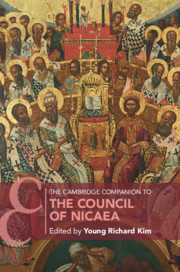Book contents
- The Cambridge Companion to the Council of Nicaea
- Cambridge Companions to Religion
- The Cambridge Companion to the Council of Nicaea
- Copyright page
- Dedication
- Contents
- Figures
- Contributors
- Acknowledgements
- Abbreviations
- 1 Introduction
- Part I Contexts
- Part II The Council
- Part III Outcomes
- 7 The Creed
- 8 The Twenty Canons of the Council of Nicaea
- 9 The Council of Nicaea and the Celebration of the Christian Pasch
- 10 Narrating the Council
- Part IV The Aftermath
- Part V The Long Reception
- Appendices
- Bibliography
- Index
- References
7 - The Creed
from Part III - Outcomes
Published online by Cambridge University Press: 17 December 2020
- The Cambridge Companion to the Council of Nicaea
- Cambridge Companions to Religion
- The Cambridge Companion to the Council of Nicaea
- Copyright page
- Dedication
- Contents
- Figures
- Contributors
- Acknowledgements
- Abbreviations
- 1 Introduction
- Part I Contexts
- Part II The Council
- Part III Outcomes
- 7 The Creed
- 8 The Twenty Canons of the Council of Nicaea
- 9 The Council of Nicaea and the Celebration of the Christian Pasch
- 10 Narrating the Council
- Part IV The Aftermath
- Part V The Long Reception
- Appendices
- Bibliography
- Index
- References
Summary
This chapter discusses the evidence for the existence of creeds before Nicaea and the purpose for which they might have been employed. The rival accounts of the origin of the Nicene formula are compared, together with the variants in the wording and the different accounts of its origin. The biblical texts that lie behind each verse of the creed are examined, and Beatrice’s argument for a pagan origin of the term homoousios is weighed against other theories. The anathemas require particular study, since the anathema on the term ktiston (“created”) is not preserved in all sources, but is crucial to the argumentation of Athanasius, who claims that it has the authority of Eusebius. The chapter then asks how the Nicene Creed was regarded after the end of the council, and whether subsequent creedal formulations were meant to reinforce or supersede it, and how it attained the form that is now regularly employed in churches.
- Type
- Chapter
- Information
- The Cambridge Companion to the Council of Nicaea , pp. 135 - 157Publisher: Cambridge University PressPrint publication year: 2021
References
Select References
- 2
- Cited by

